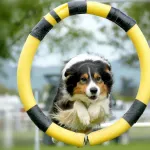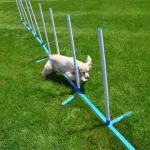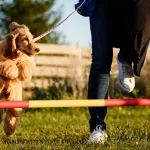Training tips
Puppy Socialization Sessions: The Key to a Happy, Well-Behaved Dog

From the moment you welcome your new furry friend, you want to ensure that they grow up to be well-behaved, confident, and friendly. One of the most important aspects of raising a well-adjusted puppy is proper puppy socialization.
Bringing a new puppy into your home is an exciting experience, but it also comes with its own set of challenges. From the moment you welcome your new furry friend, you want to ensure that they grow up to be well-behaved, confident, and friendly. One of the most important aspects of raising a well-adjusted puppy is proper puppy socialization. In this blog, we will explore why puppy socialization is essential, the benefits of puppy obedience training, and how Calidognia can guide you through these crucial early stages of your puppy’s development.
Why is Puppy Socialization Important?
Puppy socialization is the process of exposing your puppy to different environments, people, animals, sounds, and experiences in a positive and controlled manner. The goal is to help your puppy become comfortable in various situations, which can prevent fearful or aggressive behaviors later on in life. Proper socialization during the early months (ideally between 3 and 14 weeks) helps puppies build confidence, reduces anxiety, and ensures they grow up to be well-rounded and adaptable dogs.
When your puppy has been adequately socialized, they are more likely to be friendly and calm around new experiences and people. They will also have better interactions with other dogs and animals, making them a joy to take to parks, on walks, or to dog-friendly events. Socialization helps your puppy develop the social skills they need to fit well into your family and community.
The Importance of Puppy Training and Obedience
Training is a crucial part of the socialization process. Whether you're looking for puppy training near me or considering professional guidance, puppy dog training offers a range of benefits. Puppy obedience training focuses on teaching your puppy essential commands and behaviors, such as sit, stay, come, and leave it. A well-trained puppy is easier to manage and will be less likely to develop undesirable habits.
Training is also beneficial when it comes to potty training. How to potty train a puppy is a common question that many new pet owners ask. With consistent reinforcement and positive guidance, you can teach your puppy where and when to go to the bathroom. Crate training a puppy is another essential technique, as it provides a safe and secure space for your puppy when you are not around.
Key Components of Puppy Socialization
- Meeting New People and Dogs
A well-socialized puppy is comfortable meeting new people and dogs. Early exposure to different kinds of individuals and animals helps prevent aggression and fear later on. During puppy socialization sessions, it's crucial to supervise and ensure that the interactions are positive. You can take your puppy to local pet stores, dog parks, or arrange playdates with other dogs. This will teach them how to behave in different social settings.
- Exposure to Different Environments
Socializing your puppy also means introducing them to a variety of environments. Whether it’s a busy street, a park, or even the vet’s office, getting your puppy used to new places early on helps them adapt to different situations as they grow. It’s important to expose them to these environments gradually and calmly.
- Sound Desensitization
Puppies are naturally curious, but they can also be startled by unfamiliar sounds. By playing recorded noises (like thunderstorms or doorbells) at a low volume, you can desensitize your puppy to scary sounds. Over time, they will become less anxious in situations where these sounds occur.
- Potty Training and Crate Training
Another vital part of puppy obedience training is how to potty train a puppy and crate training a puppy. Potty training your puppy ensures they learn the right place to relieve themselves, while crate training helps your puppy feel secure when you are not home. Both skills are necessary for a well-behaved dog.
The Benefits of Puppy Obedience Training
In addition to puppy socialization, puppy obedience training plays a significant role in shaping your puppy’s behavior. There are many benefits to starting training early, including:
Prevention of Behavioral Problems: Proper training and socialization can help prevent issues such as barking, jumping up on people, or aggression toward other dogs.
Strengthening the Bond: Training builds trust and communication between you and your puppy, strengthening your relationship.
Better Safety: A well-trained puppy is less likely to run into dangerous situations, like running into traffic or eating harmful objects.
Peaceful Home: An obedient puppy who knows their boundaries is more likely to be calm and relaxed at home, making living with your dog more enjoyable.
Best Puppy Training Treats: What to Use
When it comes to puppy obedience training, treats play a crucial role in motivating your puppy and reinforcing positive behaviors. The best puppy training treats are small, soft, and easy to chew. Look for treats that are made from high-quality ingredients and are designed specifically for puppies. Avoid treats that are too large or hard, as they may be difficult for your puppy to chew. You can also use healthy options like small pieces of carrot or apple.
It's important to remember that training treats should be used in moderation. Treats are a great tool for rewarding good behavior, but they should not make up a significant portion of your puppy's daily diet. Always follow up with praise and affection to make training a positive and enjoyable experience for your puppy.
Puppy Training Near Me: How Calidognia Can Help
If you’re looking for puppy training near me, Calidognia offers expert puppy training services designed to help you and your puppy succeed. Our experienced trainers provide professional puppy obedience training and puppy socialization sessions that will help your puppy grow into a confident, well-behaved dog. We offer personalized sessions that cater to the unique needs of each puppy, ensuring that they receive the attention and care they deserve.
At Calidognia, we understand the challenges of puppy parenthood, and we are here to guide you through every step of the process. Whether you need help with potty training, crate training, or socializing your puppy, our team is ready to assist. We also offer training packages to suit your puppy’s needs, and our team is always available to answer your questions and offer advice.
Tips for Successful Puppy Socialization and Training
Be Consistent: Consistency is key to successful puppy training. Use the same commands and rewards each time to reinforce desired behavior.
Start Early: The earlier you start socializing and training your puppy, the better. Puppies are most receptive to new experiences between 8 and 16 weeks.
Use Positive Reinforcement: Reward your puppy with treats, praise, or play when they display good behavior.
Keep Sessions Short and Fun: Puppies have short attention spans, so keep training sessions brief and engaging.
Patience is Key: Training a puppy takes time, and there will be challenges along the way. Stay patient, and remember that each small victory is progress.
Puppy socialization is an essential aspect of raising a happy and well-behaved dog. Early exposure to new people, places, and experiences, combined with consistent puppy obedience training, ensures that your puppy will grow into a confident and well-adjusted adult dog. Whether you’re struggling with how to potty train a puppy, need assistance with crate training a puppy, or want to ensure that your puppy is properly socialized, Calidognia is here to help.
Our expert trainers are ready to guide you through every step of your puppy’s development, ensuring that your furry friend becomes the well-behaved companion you’ve always wanted. For personalized puppy training near me and puppy socialization sessions, contact Calidognia today.




